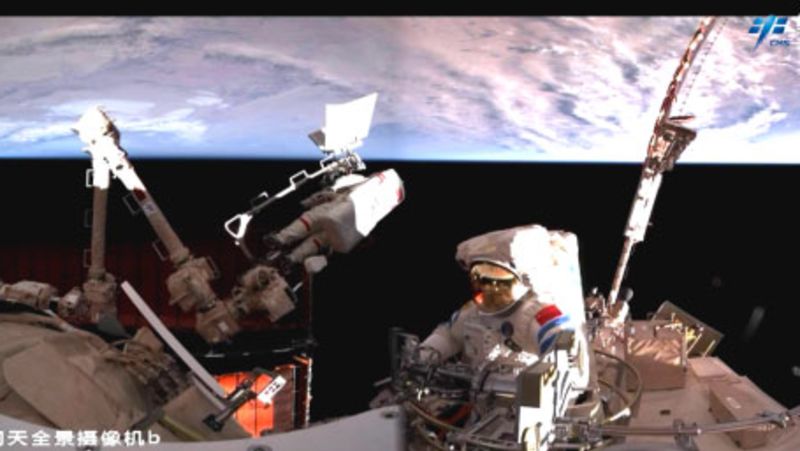World
‘Iran made a big mistake’: Israel promises revenge after missile attack
Iran launches missile attack on Israel, residents urged to shelter
Iran’s missile attack follows Israel’s announced ground invasion of Lebanon against Iran-backed Hezbollah.
Israel has vowed revenge after Iran’s missile attack on Tuesday, the latest development in what Iran said was a retaliation for Israel’s airstrikes in Lebanon, where Hezbollah is based, and its killing of Hezbollah leader Hassan Nasrallah.
The White House said Iran would face “severe consequences.” Other world leaders condemned its attack and warned it could spiral the region into a larger conflict.
Tensions between the two countries have intensified, raising concerns about a wider Middle East war. Here is what to expect and what could come next.
What just happened with Israel and Iran?
Iran launched missiles into Tel Aviv and central Israel as residents hid in bomb shelters and explosions boomed across Jerusalem the day before the Jewish holiday of Rosh Hashanah.
Israeli military spokesperson Rear Adm. Daniel Hagari said more than 180 ballistic missiles were fired from Iran. Most of the missiles were intercepted by Israel’s defense systems, according to a spokesperson for the Pentagon. Two U.S. Navy destroyers also fired around a dozen interceptors.
One man was reported dead in Jericho in the West Bank. There were no other reports of casualties from the attack as of Wednesday.
Iran’s Revolutionary Guard Corps claimed without evidence that 90% of the missiles had hit their targets.
Separately, six people, including the two gunmen, were killed in a shooting in Tel Aviv’s Jaffa neighborhood on Tuesday.
More: Spy satellites may have detected preparations for Iran’s missile attack on Israel
What happens next between Israel and Iran?
The region is bracing for Israel to strike back at Iran after Israel and the U.S. warned it would face consequences for the attack.
Israeli Prime Minister Benjamin Netanyahu threatened that Iran would “pay” for the attack and that Israel is determined to “exact a price from our enemies.”
“This evening, Iran made a big mistake – and it will pay for it,” he said at a security cabinet meeting.
The U.S. has said it will support Israel’s response. While monitoring the attack with his national security team on Tuesday, President Biden said he had directed the military to provide Israel with aid. A U.S. response “remains to be seen,” he told reporters.
National security adviser Jake Sullivan said Tuesday after the strike, “We have made clear that there will be severe consequences for this attack, and we’ll work with Israel to make that the case.”
Iranian President Masoud Pezeshkian said Wednesday that if Israel “does not stop its crimes, it will face harsher reactions.”
The Iranian Revolutionary Guard said that if Israel hit back, Iran’s response would be even “more crushing.” The country’s general staff of the armed forces said in a statement that an Israeli response would result in Iran’s “vast destruction” of Israeli infrastructure.
More: Middle East tensions flare: What to know about escalating Israel-Hezbollah fighting
What led up to the Iranian missile attack on Israel?
The Iranian attack came amid weeks of Israeli airstrikes on Lebanese territory and Hezbollah rocket launches toward northern Israel.
Earlier Tuesday, Israel launched a ground invasion of Lebanon as Israeli troops crossed over the border for the first time since 2006. Israel characterized the incursion as a “limited, localized and targeted” operation to target Hezbollah sites.
The military said Wednesday that regular infantry and armored units would add to its military presence in Lebanon. Hezbollah said its fighters were engaging with the Israeli army in the border town of Maroun al-Ras on Wednesday.
The Israeli airstrikes against Hezbollah ratcheted up after Israel’s Sept. 17 and 18 pager and walkie-talkie attacks.
On Friday, Israel killed Hassan Nasrallah, Hezbollah’s leader, in an airstrike on Beirut. CNN reported the attack was likely carried out using a U.S.-made 2,000-pound bomb.
What does Hezbollah have to do with the Israel and Iran tensions
For almost a year, the Iran-backed militant group Hezbollah has intensified firing of rockets into northern Israel. Tensions on that border have increased since the Oct. 7 attack by Hamas on Israel that killed 1,200 people. Israel responded by launching military strikes on Gaza that have killed about 40,000 Palestinians, according to the Hamas-run Gazan Health Ministry.
U.S. officials are concerned that a ratcheting up of tensions could lead to a broader regional conflict in the Middle East and have been trying to negotiate a cease-fire.
What were the reactions from other countries to the Iran missile strike on Israel?
Some world leaders condemned the attack and warned of the danger of escalation between Israel and Iran.
Other Western allies of Israel were quick to condemn the attack and reiterate their support for Israel. “I utterly condemn this attempt by the Iranian regime to harm innocent Israelis, to escalate this incredibly dangerous situation, and push the region ever close to the brink,” U.K. Prime Minister Keir Starmer said Tuesday.
German Chancellor Olaf Scholz condemned the attack “in the strongest possible terms” and urged de-escalation.
“Together with our partners, we will continue to work to broker a ceasefire between Israel and Hezbollah,” Scholz wrote on X.
China said it was deeply concerned about the attack and opposed the escalation of tensions and the “violation of Lebanon’s sovereignty, security and territorial integrity.”
“China believes that the protracted fighting in Gaza is the root cause of this round of turmoil in the Middle East, and all parties need to work urgently for a comprehensive and lasting ceasefire,” a spokesperson for the country’s foreign ministry said in a statement.
Dmitry Peskov, spokesperson for the Russian Kremlin, said Russia calls for “restraint on all sides” and condemns “any actions which lead to the deaths of civilians.”










